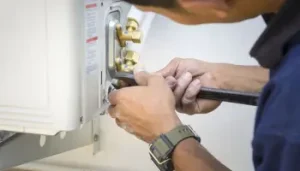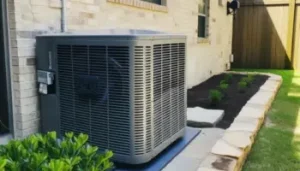The HVAC (Heating, Ventilation, and Air Conditioning) industry is significantly transforming. With smart technology and energy efficiency taking center stage, the future of HVAC will be smarter, more connected, and more sustainable than ever. Both homeowners and businesses are now prioritizing comfort while simultaneously aiming to reduce energy consumption and environmental impact. In this comprehensive guide, we’ll explore the top trends in HVAC technology shaping the future of heating, cooling, and ventilation.
The Rise of Smart HVAC Systems
Smart technology is revolutionizing how HVAC systems operate, transforming traditional heating and cooling units into highly intelligent systems that offer greater control and efficiency. Key innovations in this area include the integration of the Internet of Things (IoT), Artificial Intelligence (AI), and advanced sensors, all working together to provide real-time monitoring, automation, and optimization. Smart and experienced HVAC Technicians are also recommending these devices.
Smart Thermostats: Leading the Charge
One of the most notable advancements is the introduction of smart thermostats, such as the Nest Learning Thermostat and Ecobee Smart Thermostat. These devices allow users to control their HVAC systems from their smartphones, offering convenience at the touch of a button. What sets these thermostats apart is their ability to learn a user’s habits over time, automatically adjusting temperature settings to optimize comfort and maximize energy savings.
Additionally, smart thermostats can integrate with other smart home devices—such as smart lighting or security systems—creating a seamless and intuitive home automation experience. This integration ensures that homeowners not only save on energy costs but also enjoy a more comfortable and convenient living environment.
Whole-Home Smart HVAC Systems
Beyond thermostats, entire-home smart HVAC systems are gaining popularity. These advanced systems utilize a network of sensors placed throughout the home to monitor temperature, humidity, and even occupancy levels in real-time. AI algorithms process the data from these sensors and adjust the HVAC system accordingly.
For example, when a room becomes unoccupied, the system can automatically reduce heating or cooling in that area to conserve energy without sacrificing overall comfort. By optimizing the use of resources, smart HVAC systems represent a critical step toward more energy-efficient homes.
Energy Efficiency: The Heart of HVAC Innovation
With rising energy costs, environmental concerns, and stricter government regulations, energy efficiency has become the driving force behind HVAC innovation. Manufacturers are responding by developing highly efficient systems that not only reduce energy consumption but also lower greenhouse gas emissions.
Variable Speed Compressors: A Game-Changer
Traditional HVAC compressors operate at a single speed, often running at full capacity even when it’s not necessary. Variable speed compressors, on the other hand, can adjust their output based on the current demand for heating or cooling. This flexibility allows the system to operate at lower capacities when full power isn’t needed, significantly reducing energy consumption.
Not only do variable speed compressors improve energy efficiency, but they also lead to quieter operation and more consistent indoor temperatures, enhancing both comfort and cost savings. Not only these things but getting timely maintenance of your heating and cooling devices is also required.
Heat Pump Technology: An Efficient Solution
Heat pumps are emerging as a vital component of energy-efficient HVAC systems. Unlike traditional furnaces and air conditioners that generate heat or cold air, heat pumps work by transferring heat from one place to another, making them much more efficient.
In particular, modern inverter-driven heat pumps can adjust their speed to match the exact heating or cooling load, further improving energy efficiency and maintaining a stable indoor climate. This makes them a more sustainable alternative to conventional systems, helping homeowners and businesses lower their carbon footprint.
Integrating Renewable Energy in HVAC Systems
As the push for sustainability gains momentum, renewable energy is playing an increasingly prominent role in HVAC systems. Solar and geothermal energy are leading the charge in this area, offering alternative solutions that reduce reliance on fossil fuels.
Solar-Assisted HVAC Systems
Solar-assisted HVAC systems are becoming more common as homeowners and businesses look for ways to cut energy costs while reducing their environmental impact. These systems use solar panels to generate electricity to power the HVAC unit. In some instances, solar thermal collectors are used to capture heat from the sun, which can be used to supplement heating during colder months.
In regions with abundant sunlight, solar-assisted HVAC systems can significantly lower a building’s energy consumption, making them an attractive option for eco-conscious consumers.
Geothermal Energy for Heating and Cooling
Another innovative approach involves geothermal HVAC systems, which use the stable temperatures beneath the Earth’s surface to provide efficient heating and cooling. By exchanging heat with the ground rather than the air, geothermal systems are highly efficient and can operate effectively in both hot and cold climates.
While the initial installation costs for geothermal systems can be higher than traditional HVAC systems, their long-term energy savings and eco-friendliness make them an appealing choice for those prioritizing sustainability.
Building Automation Systems: The Future of Commercial HVAC
In large commercial and industrial applications, building automation systems (BAS) are becoming the backbone of modern HVAC technology. These systems integrate HVAC with other essential building functions—such as lighting, security, and fire protection—into a single intelligent control network.
A BAS optimizes HVAC performance by continuously monitoring factors such as temperature, humidity, occupancy, and outdoor weather conditions. By analyzing this data, the system can make real-time adjustments to ensure energy is used efficiently without compromising comfort.
Key Benefits of BAS Integration
For example, a BAS can reduce heating or cooling in unoccupied areas of a building or pre-cool a space during off-peak hours when energy costs are lower. These adjustments not only boost energy efficiency but also lower operational costs, all while enhancing the comfort of building occupants. In an era of rising energy prices, the ability to fine-tune HVAC performance is a critical advantage for businesses looking to reduce overhead.
The Path Forward for HVAC Technology
The future of HVAC technology is undeniably rooted in smart systems, energy efficiency, and renewable energy sources. As homes and businesses continue to seek out more sustainable and cost-effective solutions, the HVAC industry will be at the forefront of this shift. From smart thermostats and energy-efficient compressors to solar-powered systems and geothermal energy, the innovations outlined above represent just a glimpse of the future.
By embracing these advancements, homeowners and businesses can reduce their energy consumption, lower their utility bills, and contribute to a more sustainable planet—all without sacrificing comfort or performance.



